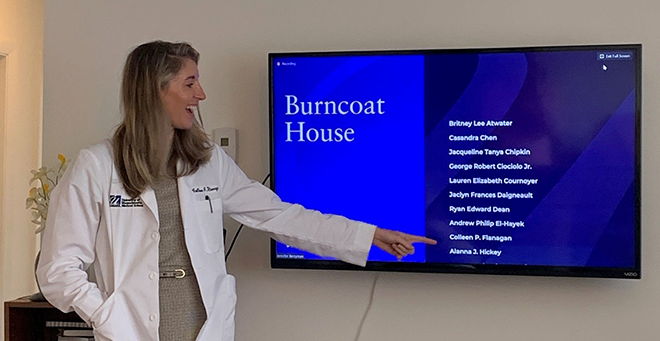
|
It was a sudden, but thrilling change for the School of Medicine’s Class of 2020, graduating two months early from UMass Medical School with only a few days notice, allowing the new physicians to head into the work force early amid the spreading COVID-19 pandemic.
“We had a Zoom meeting with our class and Chancellor Collins last week, and I expected to be told that commencement was cancelled,” said Janki Patel, MD, who matched at Washington University in internal medicine. “To my surprise, we got a very different notice. I’m glad Massachusetts schools are staying ahead of the game and helping get more physicians in the field.”
From the confines of their homes on Tuesday, March 31, 135 students went online and heard their names—now preceded by “doctor”—read in a virtual commencement ceremony. In response to the COVID-19 pandemic, the state Board of Registration of Medicine streamlined the process to grant limited medical licenses, enabling early graduates to accept clinical assignments at primary care practices, community health centers and hospitals in Massachusetts and elsewhere. UMass Medical School quickly planned the virtual commencement ceremony so that its new grads will be able to volunteer, if they choose, to start their careers immediately.
“This is the time we’ve all been waiting for for the past four years,” said Fatoumah “Nogoy” Bah, MD. She matched in anesthesiology at her first choice, New York Presbyterian/Weill Cornell Medical Center. “I feel really excited right now, this is such a historic moment.”
As the novel coronavirus continues to pose a threat to societies worldwide, graduates said this is a daunting situation to face. However, they feel prepared.
“There’s a lot of concern now with supply shortages and low patient capacity, so of course, no one can ever truly be ready for something like this,” said Colleen Flanagan, MD, matching at University of California at San Francisco for vascular surgery. “It will be a challenge, but I do think in terms of our training, we are ready to give back meaningfully.”
“I think that UMass has provided my class, and all the classes before, with the right tools to handle this sort of scenario,” said Ashley Matthew, who graduated with MD/PhD degrees and matched in urology at her first choice, Virginia Commonwealth University. Dr. Matthew received the Chancellor’s Award, the highest recognition given among the graduating class.
“I believe that regardless of how we feel, we’re all equipped for the next steps,” Dr. Matthew said. “We’re all in a position where we’ve learned the best clinical skills from UMass and can go save lives.”
“At first I was thinking ‘Am I ready for this,’ but then I look back on where I was as a first-year compared to now,” said Dr. Bah. “I feel medical school has taught me put in all my effort, do as much as I can and use my resources.”
Timothy Chang graduated as an MD/PhD, matching in pediatrics at Boston Children’s Hospital. He said that while it’s difficult to process what lies ahead, it’s important to remember why he chose this path.
“I’m taking this day by day as things keep changing, and doing my best to adapt,” Dr. Chang said. “I’m just waiting for the call to help. To anticipate something of this nature, I’ve been involved in training for things like telehealth. I know my former classmates and I are ready to jump in when the call arises and we have to step in.”
Although students said it was difficult not to be able to celebrate commencement in person, their careers take precedence.
“What is pessimism going to do at a time like this?” Matthew said. “Of course I’m sad, but it’s an honor and a privilege to achieve this goal and be a doctor to help people in different ways.
“I’ve been to so many Match Days, but not my own,” said Dr. Flanagan. “I’m upset that I wasn’t able to get that emotional attachment, but it’s bigger than that. We didn’t do four years of medical school to sit back in a time of need. I think it makes sense for us to contribute as much as we can.”
Now, on the frontlines of a global pandemic, it’s time to make those contributions.
“I’m really looking forward to doing what I’ve been set out to do, and play a role in treatment, care and beyond,” said Chang. “Although the current situation is scary, this is what we trained for.”